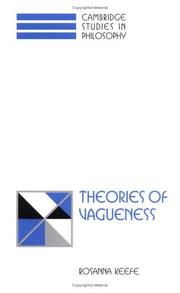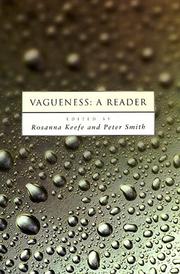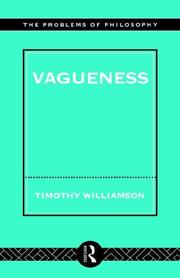| Listing 1 - 10 of 16 | << page >> |
Sort by
|

ISBN: 0511052154 0511151454 051101032X 9780511010323 0511036922 9780511036927 9780521650670 0521650674 Year: 2000 Publisher: Cambridge New York Cambridge University Press
Abstract | Keywords | Export | Availability | Bookmark
 Loading...
Loading...Choose an application
- Reference Manager
- EndNote
- RefWorks (Direct export to RefWorks)
Most expressions in natural language are vague. But what is the best semantic treatment of terms like 'heap', 'red' and 'child'? And what is the logic of arguments involving this kind of vague expression? These questions are receiving increasing philosophical attention, and in this timely book Rosanna Keefe explores the questions of what we should want from an account of vagueness and how we should assess rival theories. Her discussion ranges widely and comprehensively over the main theories of vagueness and their supporting arguments, and she offers a powerful and original defence of a form
Book
ISBN: 3030667812 3030667804 Year: 2021 Publisher: Cham, Switzerland : Springer,
Abstract | Keywords | Export | Availability | Bookmark
 Loading...
Loading...Choose an application
- Reference Manager
- EndNote
- RefWorks (Direct export to RefWorks)
Book
ISBN: 1474202756 9781509904457 150990445X 1509904441 Year: 2020 Publisher: London [England] : [London, England] : Hart Publishing, Bloomsbury Publishing,
Abstract | Keywords | Export | Availability | Bookmark
 Loading...
Loading...Choose an application
- Reference Manager
- EndNote
- RefWorks (Direct export to RefWorks)
"Lawmaking is - paradigmatically - a type of speech act: people make law by saying things. It is natural to think, therefore, that the content of the law is determined by what lawmakers communicate. However, what they communicate is sometimes vague and, even when it is clear, the content itself is sometimes vague. This monograph examines the nature and consequences of these two linguistic sources of indeterminacy in the law. The aim is to give plausible answers to three related questions: In virtue of what is the law vague? What might be good about vague law? How should courts resolve cases of vagueness? It argues that vagueness in the law is sometimes a good thing, although its value should not be overestimated. It also proposes a strategy for resolving borderline cases, arguing that textualism and intentionalism - two leading theories of legal interpretation - often complement rather than compete with each other.--
Law --- Vagueness (Philosophy) --- Interpretation and construction. --- Philosophy.
Book
ISBN: 9783110319453 3110319454 1299722083 3110319128 Year: 2013 Publisher: Berlin Boston
Abstract | Keywords | Export | Availability | Bookmark
 Loading...
Loading...Choose an application
- Reference Manager
- EndNote
- RefWorks (Direct export to RefWorks)
This book opens up a new area of research by not only considering the rationality of such diverse phenomena as ordinary emotions, generalized anxiety disorder, social phobia, psychotic depression, major depressive disorder, and bipolar disorder, but also by evaluating the question whether the vagueness of these diverse disorders and emotions poses an obstacle to the rationality of these phenomena. As these emotional phenomena turn out to be vague on many different levels, an explanation is found for the millennia long dispute of which kind of phenomena fall under the emotions and whether such diverse phenomena as hope and alexithymia fall under the emotions. Since vagueness can be most easily identified in mixed feelings, the rationality of mixed feelings will also be dealt with.
Emotions (Philosophy) --- Reason. --- Vagueness (Philosophy) --- Philosophy --- Mind --- Intellect --- Rationalism

ISBN: 0262112256 0262276887 0585021279 9780585021270 9780262112253 9780262276887 0262041960 9780262611459 0262611457 0262541785 0262256053 0262260611 Year: 2002 Publisher: Cambridge (Mass.): MIT Press,
Abstract | Keywords | Export | Availability | Bookmark
 Loading...
Loading...Choose an application
- Reference Manager
- EndNote
- RefWorks (Direct export to RefWorks)
Vagueness is currently the subject of vigorous debate in the philosophy of logic and language. Vague terms - such as 'tall', 'red', 'bald', and 'tadpole' - have borderline cases (arguably, someone may be neither tall nor not tall); and they lack well-defined extensions (there is no sharp boundary between tall people and the rest). So the phenomenon of vagueness poses a fundamental challenge to classical logic and semantics, which assumes that propositions are either true or false and that extensions are determinate. Another striking problem to which vagueness gives rise is the sorites paradox. If you remove one grain from a heap of sand, surely you must be left with a heap. Yet apply this principle repeatedly as you remove grains one by one, and you end up, absurdly, with a solitary grain that counts as a heap. This anthology collects for the first time the most important papers in the area.
Logic --- Philosophy of language --- Vagueness (Philosophy) --- Philosophy --- Philosophy & Religion --- Human-computer interaction. --- Kunstmatige intelligentie. --- Mens-computer interactie. --- Vagueness (philosophy)

ISBN: 1134770170 9786610020065 1134770189 1280020067 020301426X 9780203014264 9780415033312 0415033314 9780415139809 0415139805 9781134770175 661002006X 0415033314 0415139805 9781134770137 9781134770182 9781280020063 Year: 1994 Publisher: London: Routledge,
Abstract | Keywords | Export | Availability | Bookmark
 Loading...
Loading...Choose an application
- Reference Manager
- EndNote
- RefWorks (Direct export to RefWorks)
When did Rembrandt get old? Such questions eventually lead us to the problem of vagueness. Williamson traces its history, questions conventional theories and defends the realist view that vagueness is a kind of ignorance.
Vagueness (Philosophy) --- Philosophy --- Logic --- Language and languages --- Vague (Philosophie) --- Logique --- Langage et langues --- Philosophie --- Philosophy of language --- Vagueness (Philosophy).
Book
ISBN: 9781107089594 9781316105597 9781107461154 9781316204924 1316204928 9781316208588 1316208583 1316105598 110708959X 1107461154 1316191923 1316212270 1316190099 1316210448 1316206726 1316203085 1322882274 Year: 2015 Publisher: Cambridge [etc.] Cambridge University Press
Abstract | Keywords | Export | Availability | Bookmark
 Loading...
Loading...Choose an application
- Reference Manager
- EndNote
- RefWorks (Direct export to RefWorks)
Modernist Fiction and Vagueness marries the artistic and philosophical versions of vagueness, linking the development of literary modernism to changes in philosophy. This book argues that the problem of vagueness - language's unavoidable imprecision - led to transformations in both fiction and philosophy in the early twentieth century. Both twentieth-century philosophers and their literary counterparts (including James, Eliot, Woolf, and Joyce) were fascinated by the vagueness of words and the dream of creating a perfectly precise language. Building on recent interest in the connections between analytic philosophy, pragmatism, and modern literature, Modernist Fiction and Vagueness demonstrates that vagueness should be read not as an artistic problem but as a defining quality of modernist fiction.
Modernism (Literature) --- Fiction --- Vagueness (Philosophy) --- Language and languages in literature. --- Philosophy --- Crepuscolarismo --- Literary movements --- Postmodernism (Literature) --- History and criticism. --- Language and languages in literature --- History and criticism
Book
ISBN: 019939265X 0199915113 0199915105 1306082234 9780199392650 9780199915118 9780199915101 Year: 2013 Publisher: New York, NY
Abstract | Keywords | Export | Availability | Bookmark
 Loading...
Loading...Choose an application
- Reference Manager
- EndNote
- RefWorks (Direct export to RefWorks)
In 'Unruly Words', Diana Raffman advances a new theory of vagueness which, unlike previous accounts, is genuinely semantic while preserving bivalence. According to this new approach, called the multiple range theory, vagueness consists essentially in a term's being applicable in multiple arbitrarily different, but equally competent, ways, even when contextual factors are fixed.
Semantics. --- Vagueness (Philosophy) --- Ambiguity. --- Language and languages --- Grammar, Comparative and general --- Semantics --- Philosophy --- Formal semantics --- Semasiology --- Semiology (Semantics) --- Comparative linguistics --- Information theory --- Lexicology --- Meaning (Psychology) --- Philosophy.
Book
ISBN: 9783110374674 3110374676 9783110340280 3110340283 9783110347807 3110347806 9783110347791 3110347792 1306529581 Year: 2014 Publisher: Berlin/Boston
Abstract | Keywords | Export | Availability | Bookmark
 Loading...
Loading...Choose an application
- Reference Manager
- EndNote
- RefWorks (Direct export to RefWorks)
Die überwiegende Zahl der Begriffe in natürlichen Sprachen verfügt über unscharfe Begriffsumfänge. Sie lassen Grenzfälle zu, d.h. es gibt Gegenstände, für die nicht ohne Weiteres feststeht, ob sie unter den jeweiligen Begriff fallen oder nicht. Wo geht zum Beispiel Rot in Orange über? Solche Begriffe sind vage. Sie können zu logischen Problem führen, da die Sätze, die sie enthalten, oft nicht eindeutig als wahr oder falsch bewertet werden können. Vagheit wird darum meist als Defekt natürlicher Sprachen betrachtet. Doch die Vagheit in den natürlichen Sprachen hat auch Vorteile, die in dieser Arbeit aufgezeigt werden: Die Kommunikation mit vagen Prädikaten ist trotz aller formallogischen Probleme in der Regel erfolgreich. Durch sie ist eine effiziente, ökonomische und flexible Kommunikation möglich. Vage Prädikate tragen zudem den limitierten kognitiven Ressourcen und Wahrnehmungsfähigkeiten des Menschen Rechnung. Die Arbeit untersucht zudem, ob Vagheit im Recht positive Aspekte hat, und analysiert alltagspraktische Anknüpfungspunkte.
Semantics. --- Vagueness (Philosophy) --- Ambiguity. --- Language and languages --- Grammar, Comparative and general --- Semantics --- Philosophy --- Formal semantics --- Semasiology --- Semiology (Semantics) --- Comparative linguistics --- Information theory --- Lexicology --- Meaning (Psychology) --- Philosophy. --- Borderline Cases. --- Philosophy of Language. --- Semantic Extension.
Book
ISBN: 940077978X 9400779771 Year: 2014 Publisher: Dordrecht : Springer Netherlands : Imprint: Springer,
Abstract | Keywords | Export | Availability | Bookmark
 Loading...
Loading...Choose an application
- Reference Manager
- EndNote
- RefWorks (Direct export to RefWorks)
This unique anthology of new, contributed essays offers a range of perspectives on various aspects of ontic vagueness. It seeks to answer core questions pertaining to onticism, the view that vagueness exists in the world itself. The questions to be addressed include whether vague objects must have vague identity, and whether ontic vagueness has a distinctive logic, one that is not shared by semantic or epistemic vagueness. The essays in this volume explain the motivations behind onticism, such as the plausibility of mereological vagueness and indeterminacy in quantum mechanics, and they offer various arguments both for and against ontic vagueness; onticism is also compared with other, competing theories of vagueness such as semanticism, the view that vagueness exists only in our linguistic representation of the world. Gareth Evans’s influential paper of 1978, “Can There Be Vague Objects?” gave a simple but cogent argument against the coherence of ontic vagueness. Onticism was subsequently dismissed by many. However, in recent years, researchers have become aware of the logical gaps in Evans’s argument, and this has triggered a new wave of interest in onticism. Onticism is now widely regarded as at least a coherent view. Reflecting this growing consensus, the present anthology for the first time puts together essays that are focused on onticism and its various facets, and it fills in the lacuna in the literature on vagueness, a much-discussed subject in contemporary philosophy.
Vagueness (Philosophy) --- Ontology. --- Being --- Philosophy --- Metaphysics --- Necessity (Philosophy) --- Substance (Philosophy) --- Philosophy (General). --- Logic. --- Metaphysics. --- Philosophy, general. --- God --- Ontology --- Philosophy of mind --- Argumentation --- Deduction (Logic) --- Deductive logic --- Dialectic (Logic) --- Logic, Deductive --- Intellect --- Psychology --- Science --- Reasoning --- Thought and thinking --- Methodology --- Philosophy. --- Mental philosophy --- Humanities
| Listing 1 - 10 of 16 | << page >> |
Sort by
|

 Search
Search Feedback
Feedback About UniCat
About UniCat  Help
Help News
News